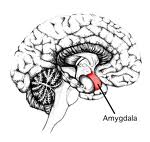Welcome to Amygdale
1 juli 2010 | In Emotion theory Neuroscience Psychology | Comments?
How do we know that the Amygdala is important for emotions, like fear? Well, how do I know that Lisa got ticklish feet? When I tickle them, she reacts in a certain manner, characteristic of people being tickled. And when she reacts in that way, it’s a safe bet that someone is tickling her feet. Similarly, when we do stuff to the amygdala, interesting events occur. And when those events occur, the Amygdala is usefully regarded as one of the prime suspects.
Now, there is criticism. Ah. The Amygdala does not act alone. Of course it doesn’t. So how can we say that the amygdala is the ”essence”, the ”center” of negative emotion say, or emotional learning, when it is obviously much more complicated than that? Well, in fact, Lisa’s feet aren’t ticklish acting on their own. If you cut them off, and tickle them, nothing much happens. Ticklishness is a much more distributed affair, but we know what we mean when we say that her feet are ticklish. And often, we are not looking to say anything more specific about neural structures: they are interesting nodes in the network, say. They are particularly prominent points of entry to the whole package of events that make up the thing we’re interested in.
When our purposes are limited, it is enough to know that much. When there are important complications, however, we need to know more. Part of that consists in checking out the pathways between feet and brain and other parts of the body. Part of it consists in checking what question we are actually asking/interested in. How can her ticklishness be exploited? What is the evolutionary advantage of being ticklish?
When someone exhibits emotional dysfunction, we cannot jump directly to any particular conclusion about the cause. Even if we narrow it down to neural causes, the dysfunction might be due to some neurotransmitter deficiency, or to anatomical damage. It’s like when the pizza doesn’t get there. Is it the fault of the baker, the delivery truck, the road, the order, or what?